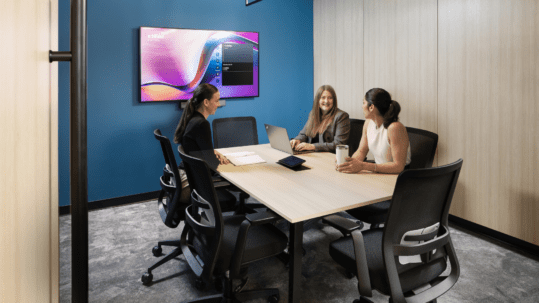A growing number of professional businesses are offering remote or hybrid working arrangements for employees, reducing the necessity for employees to be physically present at the office. As a result of these changes in work structure, companies may explore reducing their office space or going completely remote, eliminating the need for an office.
As these questions about office space arise, it is critical to consider what leading companies are doing and the purpose of having an office. Looking at companies like Meta and Google, were among the first to let some employees work from home permanently while still investing billions of dollars in increasing their office spaces. You can see that it is not a binary decision and that you can still work hard to improve your space while offering staff flexibility.
To aid you in deciding whether to keep an office, think about these advantages of having a physical office.
Optimize innovation and collaboration
An office does more than offer employees a place to work. It supplies optimized workstations, usually surrounded by colleagues, allowing for easy collaboration and effective communication when necessary. Working online has some advantages, but when teams do not get together enough, cooperation suffers, and teams are disconnected. Even in the digital age, digital interactions do not have the same value as face-to-face ones.
Supplying a physical office where employees can easily exchange insights, thoughts, and casual chats promotes innovation. Employees are freer to bounce ideas off each other because they are not bound by a rigid online meeting schedule to interact, thus increasing innovation. Collaboration levels among a team are certainly more convenient when they can work directly alongside each other. Working together in a shared work environment helps employees to be energized by one another and to explore their creativity and skills with one another more effectively.
Strengthened company culture
A company’s culture can greatly benefit from a physical workspace. Culture influences a person’s job satisfaction and ensures they are more involved and passionate about their job. Creating a space that incorporates your core values and cultural initiatives generates a positive work culture that inspires your team and helps your organization thrive. An office is a fantastic hub for employees to gather for team lunches, celebrations, and teambuilding exercises that help to enhance corporate culture. Moreover, your employees will have a weak sense of culture if they do not have a place to gather for these activities and procedures.
Increased productivity
During the full-force work-from-home journey at the height of the pandemic, we observed that some people have trouble focusing while working remotely. Varying home circumstances may result in difficult or disruptive working conditions for employees. From noisy children to uncomfortable homemade work setups, it is common for people to feel less productive while working from home. Curating an office atmosphere that allows employees to escape the stresses of home and find a quiet spot to focus can enhance their productivity. Employees can handle their workload better when they can sit down and focus on their tasks away from distractions.
Connecting people
When working remotely, people are less connected to each other, the company, and its goals. An office allows people to come together and connect. Gathering employees in person enables them to engage as a group, enhance team spirit, create a social buzz, and aid in the transformation of professional connections into personal ones. People feel more connected when they are able to conduct business or informal conversations in person, whether that is a few times a week, once a week, or once a month.
Better training and professional development
Physical office space is beneficial for training new employees. When newcomers are personally introduced to work processes and procedures, they integrate more successfully. Some claim that online training is just as successful. However, studies have shown that formal training and a physical office environment help new workers gain practical work knowledge. Furthermore, working together in person makes it easier to answer questions and notice and rectify mistakes.
Employees in an office setting are more exposed to different situations, which is a valuable part of their development. Knowledge transfer is facilitated in an office setting because managers are present and readily available for advice, ideas, and support. These in-person encounters improve professional development and handle problems more rapidly, ultimately leading to a more efficient organization.
_________
Permanently working from home can have some serious implications. Some challenges from a fully remote company are limited collaboration, a lack of corporate culture, low productivity, decreased employee connection, and impeded knowledge transfer. However, forcing employees to return to an office that is not supportive of their best work is illogical. The best course of action is to invite them back while reframing the purpose of the office. A workplace is no longer only a place where people sit at their workstations to do their work. As we saw during the pandemic, people can do this just as well from home. That being said, an office has transformed into a place for individuals to collaborate, learn, and cultivate a strong company culture. People can continue to work from home, but supplying a space for people to connect, discuss, and learn from one another is essential for enabling this new way of working.






